Healthy GL series are no longer rare exceptions. They are quietly reshaping sapphic storytelling with emotional safety, care, and honesty.
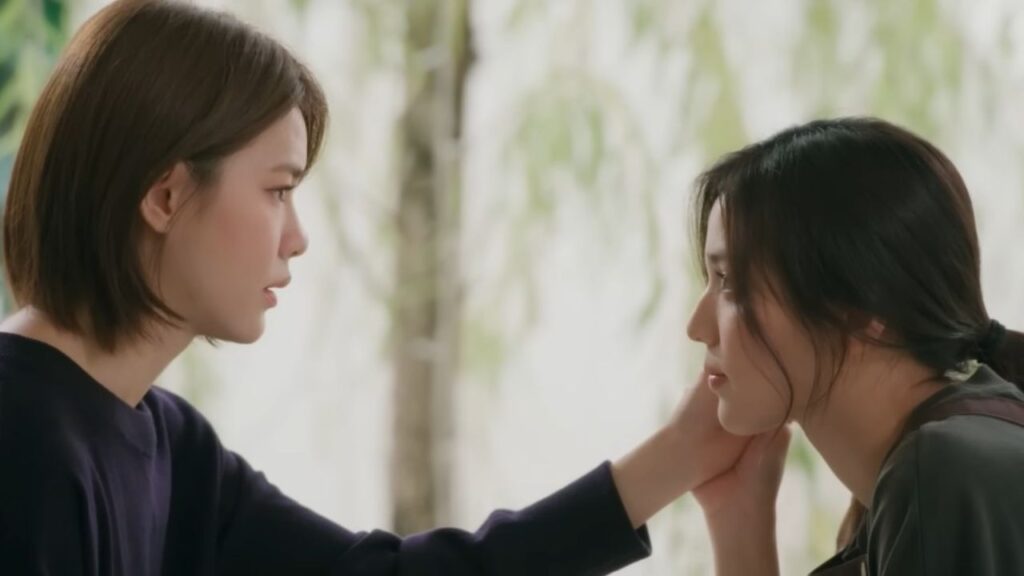
A few years ago, we could barely count one girls’ love drama per year. Now, several run simultaneously across platforms, genres, and formats, and that’s worth celebrating.
However, with this growth, a pattern becomes hard to ignore. Many stories rely heavily on emotional chaos. Miscommunication, jealousy, and manipulation disguised as passion often dominate the screen.
Certainly, messy characters can grab our attention. After all, love is rarely simple. Yet, when most sapphic romances focus mainly on tension and immaturity, we start to ask: where are the healthy dynamics?
Where are the couples who talk things through before everything falls apart? Who truly listen? Who show vulnerability not as weakness but as a way to build trust?
They do exist, just more quietly.
These dramas may lack loud betrayals or endless twists, but that is exactly why they feel so real and necessary. They offer intimacy that reflects the kind of love we want and deserve.
In a genre still finding its footing, these healthy GL series take a bold step. They prove sapphic love stories can be safe, joyful, and emotionally mature.
This post celebrates the shows that heal rather than hurt. Let’s explore these underrated gems that finally offer relationships built on care, respect, and growth.
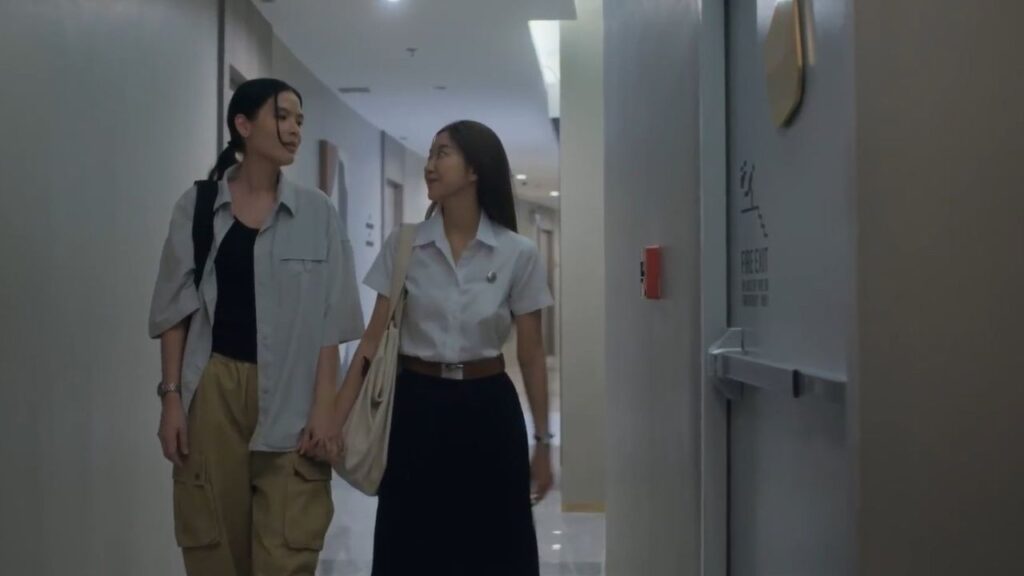
Table of Contents
- What Even Is a Healthy GL Relationship?
- 1. “Us”: When Communication Is the Main Character
- 2. Reverse 4 You: Romance, Time Travel, and Respect
- 3. Petrichor: Darkness Without the Dysfunction
- 4. 23.5: A Soft Glow with Serious Depth
- 5. Reverse with Me: Chaos on the Outside, Calm on the Inside
- Why Healthy GL Series Deserve More Hype
- Healthy Doesn’t Mean Boring: It Means Brave
- You Deserve to See Yourself in Love That Feels Safe
- Add Your Favorite Healthy GL Series
What Even Is a Healthy GL Relationship?
Before we dive into the series, let’s clarify what we mean by “healthy.”
We don’t expect perfect characters who never mess up. No one wants relationships that feel scripted or sanitized. Conflict happens. Growth is messy. Mistakes occur.
Yet we must distinguish between natural flaws and repeated emotional harm disguised as passion. A healthy sapphic relationship, whether in real life or on screen, means both people feel emotionally safe.
Honest communication matters, even when it’s difficult. Respecting boundaries shows care, while constantly testing them only harms trust. Apologies must bring real change, not just empty words.
Partners should lift each other up instead of tearing each other down for the sake of drama.
We’ve seen too many stories romanticize manipulation, confuse jealousy for love, and excuse cheating because “the chemistry is strong.”
In contrast, healthy GL series show something rare: couples who actually talk things through. They don’t need a breakup every two episodes to keep things interesting. They feel believable not because they’re dramatic, but because they’re emotionally real.
And yes, these stories still engage us. Watching people navigate love with empathy and respect is just as powerful, maybe even more so.
So when we say “healthy,” we don’t mean boring. We mean bold enough to show love that doesn’t hurt.
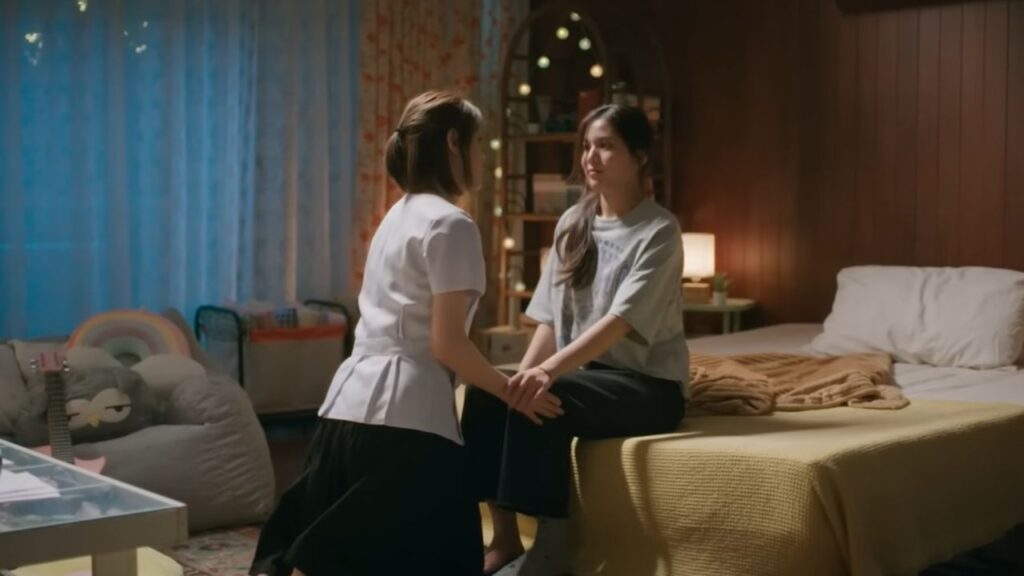
1. “Us”: When Communication Is the Main Character
If you’re used to GL series packed with chaos, “Us” might catch you off guard in the best way.
There are no grand betrayals, no screaming matches, no toxic love triangles. Just two young women navigating the quiet complexity of love, heartbreak, and emotional responsibility.
Dokrak, fresh out of high school, meets Pam, a calm and thoughtful dentistry student, while working at a coffee shop. The connection is instant, but so is the restraint. When Dokrak learns that her own brother has feelings for Pam, she chooses loyalty over desire. Not out of self-erasure, but out of love.
What follows isn’t a melodrama. It’s something softer, slower, and arguably more intimate: a portrait of longing that isn’t selfish, and heartbreak that isn’t destructive.
Pam and Dokrak’s relationship is built not on secrets or power games, but on gentle honesty. Even when things don’t go the way we want, their choices are grounded in empathy. And that makes the emotional impact hit deeper.
There’s no moment where someone needs to be “fixed.” No wild plot twist to salvage the pacing. Just two women trying their best, with dignity, respect, and open hearts.
In a sea of noise, “Us” speaks softly and somehow it echoes louder. It reminds us that communication isn’t just a subplot; it can be the story, and sometimes the most revolutionary thing a GL series can do is show love that listens.
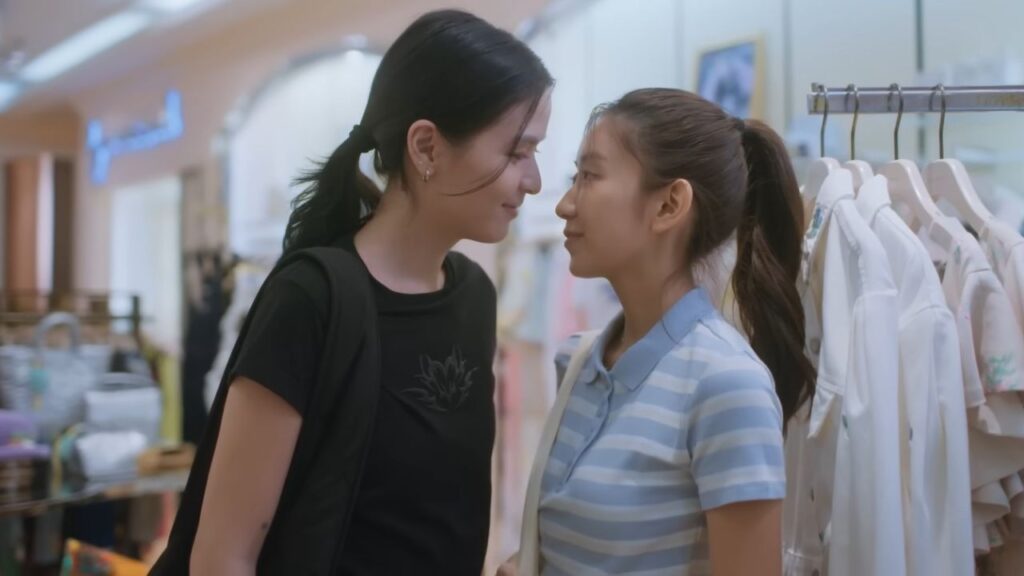
2. Reverse 4 You: Romance, Time Travel, and Respect
But what makes Reverse 4 You memorable isn’t just its sci-fi premise. It’s the emotional grounding underneath all the multiverse madness.
At the center of this chaotic timeline is Jattawa, a law student with the power to manipulate time, and P’Four, a business major whose presence seems to echo across realities. Their connection could’ve easily become a plot device. Instead, it becomes the emotional anchor of the story.
These two aren’t just destined lovers stuck in a time loop. Instead, they choose to care for each other through uncertainty. When misunderstandings arise, Jattawa and P’Four avoid spiraling into blame or passive-aggressive silence. Rather, they talk, reflect, and pause when they need to.
Their emotional maturity is even more striking when you realize how intense the stakes are. We’re talking future visions, dangerous timelines, and the threat of fate pulling them apart at every turn. Still, their biggest strength isn’t their power. It’s their empathy.
This series doesn’t romanticize drama for the sake of it. The tension feels earned because it’s never rooted in toxic behavior. It’s about decisions, not dysfunction. Accountability, not angst.
And even when things go wrong, as they often do in alternate realities, Jattawa and P’Four never stop choosing each other. Again and again.
Reverse 4 You reminds us that love doesn’t have to be a battlefield. Sometimes, it’s a collaboration. Even when the timeline breaks.

3. Petrichor: Darkness Without the Dysfunction
A sapphic crime thriller that doesn’t romanticize chaos? Now that’s a twist.
Petrichor stands out in a genre that often leans hard into betrayal, trauma bonding, and emotional manipulation. Instead, it offers something refreshingly grounded: two women, Tul and Cherran, navigating a dangerous world with emotional honesty intact.
Tul works as a private investigator, haunted by her past. Meanwhile, Cherran is a brilliant scientist who hides secrets of her own. Their relationship could have easily become a toxic tug-of-war filled with suspicion, jealousy, and heartbreak.
However, it doesn’t. From the very first episode, a quiet understanding grows between them. They ask questions and listen carefully. When needed, they give each other space to breathe.
Even in high-stress situations like murders, surveillance, and missing persons, they never use pressure or deception to get what they want from one another. And that’s what makes Petrichor so quietly radical: it treats emotional safety as non-negotiable, even in life-or-death scenarios.
There’s tension, yes. Stakes are high. But the series never falls back on cruelty or manipulation for drama. Instead, it builds tension through mystery, moral complexity, and the slow, steady development of trust.
Tul and Cherran’s connection isn’t built on saving or fixing each other. It’s about seeing one another clearly and choosing to stay anyway.
In a genre that often celebrates the idea that love must be painful to be real, Petrichor proves otherwise. Turns out, you can have suspense, shadows, and sapphic longing, all without the toxicity.
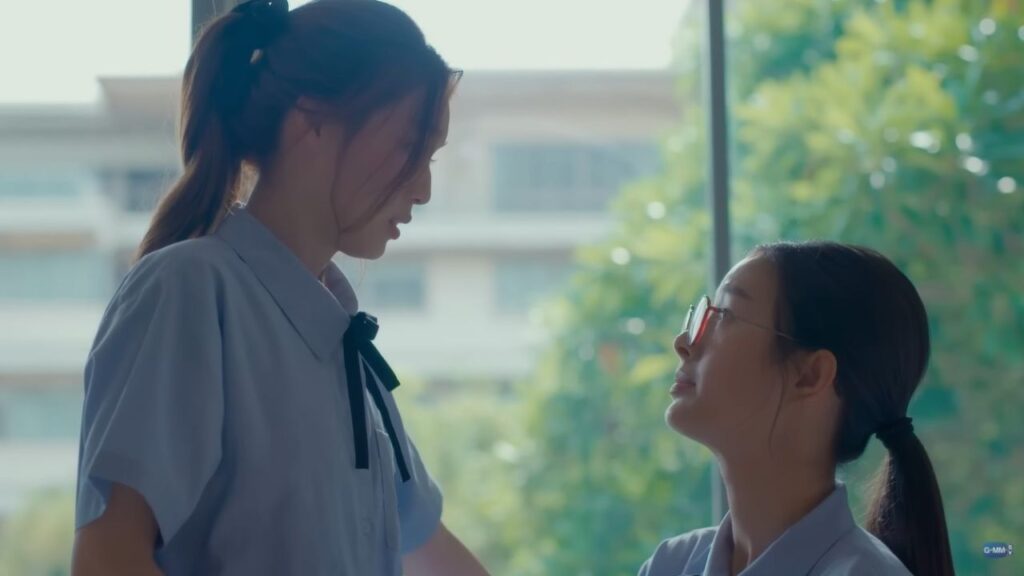
4. 23.5: A Soft Glow with Serious Depth
We’ve seen enough school-based GL dramas to know the formula: miscommunication, jealousy, secrets, repeat.
But 23.5 does something different. It respects its characters. It respects the audience. And it respects the idea that sapphic love, even in its early stages, can be emotionally intelligent.
Ongsa isn’t the typical flustered girl with a hopeless crush. And Sun isn’t a one-dimensional “popular” type. Instead, we get two teens who communicate, flaws and all. There’s sweetness, sure, but it’s balanced by an honesty that feels rare, especially in stories about young love.
The central conflict, Ongsa hiding behind the Instagram alias “Earth,” isn’t played for endless drama. It’s a mistake she owns. And when the truth surfaces, it’s not a disaster. It’s a turning point.
We watch as Ongsa and Sun choose to listen, not lash out. To clarify, not collapse. That kind of maturity, in a high school setting, feels almost groundbreaking.
And the result? A relationship that doesn’t need spectacle to feel meaningful. The intimacy grows through casual chats, soft glances, and shared vulnerability.
It’s not about “will they or won’t they.” It’s about how they show up for each other when it counts.
23.5 doesn’t yell to be noticed, but it absolutely deserves your attention. It’s proof that teenage characters can model healthier love than many adults on screen.
And maybe that’s what makes it shine the brightest.
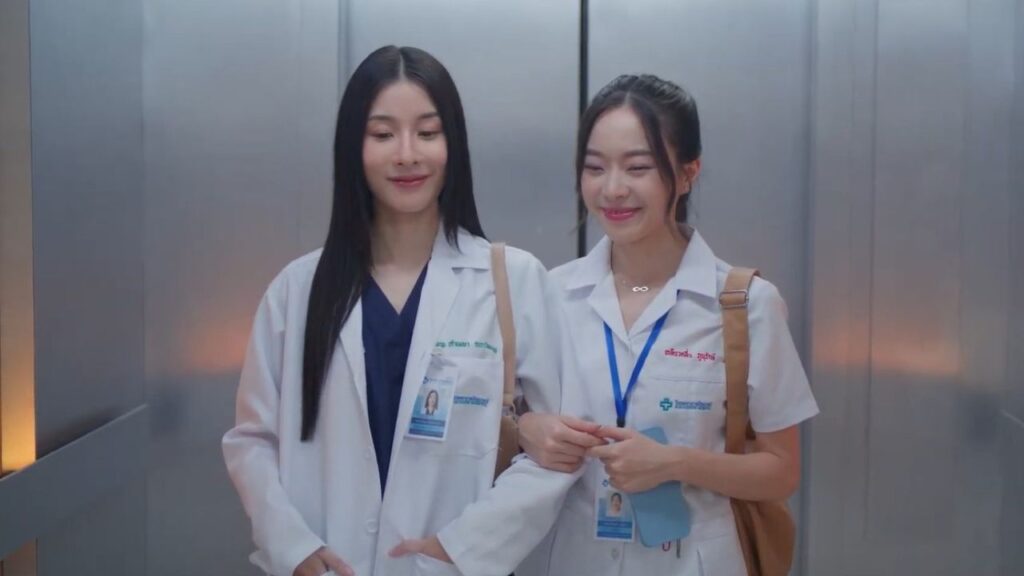
5. Reverse with Me: Chaos on the Outside, Calm on the Inside
What happens when the world collapses, but your relationship doesn’t?
Reverse with Me delivers a rare answer: you hold each other steady.
Set in a collapsing universe where timelines blur and survival is uncertain, this GL could’ve easily fallen into the usual traps: emotional manipulation, mistrust, or one-sided devotion. But instead, Kliao and Karan offer something far more subversive: calm, mutual care.
Their love story grows through quiet moments of support rather than grand gestures or tearful breakdowns. Instead of yelling to be heard or testing each other’s limits, they communicate calmly. They talk, and they listen. Despite a world that constantly threatens to pull them apart, they choose to return to each other again and again.
Even when tensions rise and the situation becomes life-threatening, they don’t turn on each other. There’s no jealousy-fueled argument, no emotionally cruel subplot designed to spice things up. Instead, we watch two people co-regulate in the middle of chaos, reassuring one another, affirming boundaries, and taking turns being strong.
It’s emotionally mature storytelling in a sci-fi setting, and that combination feels like a quiet revolution.
Kliao and Karan’s relationship is a reminder that healthy doesn’t mean boring. It means safe enough to grow, even when everything else is falling apart. And in a genre that often equates suffering with passion, Reverse with Me dares to show love as something healing, not harmful.
Because sometimes, surviving the world starts with surviving each other, with grace.
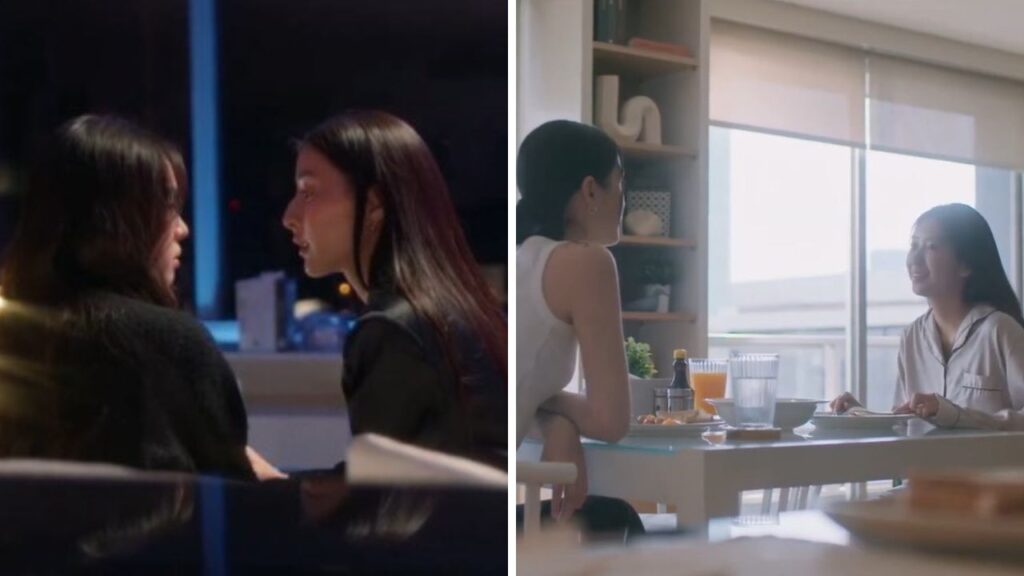
Why Healthy GL Series Deserve More Hype
Let’s be honest: drama gets the clicks.
Toxic tropes, emotional rollercoasters, and chaotic romances still dominate the spotlight in sapphic media. And it’s not hard to see why: they’re fast-paced, emotionally charged, and endlessly memeable. But here’s the thing: just because something’s loud doesn’t mean it’s lasting.
That’s why healthy GL series deserve more hype.
These stories might not trend for their shock factor, but they resonate on a deeper level. They offer something a lot of us didn’t grow up seeing: sapphic love that’s safe. That’s patient. That’s grounded in respect instead of rivalry.
Shows like Us, 23.5, and Reverse with Me don’t just give us cute couples. They give us relational blueprints. We see characters apologize without being forced. We see boundaries respected, emotional safety prioritized, and personal growth nurtured. It’s not utopia. It’s just what love looks like when it’s not designed to self-destruct.
And yes, these stories are quieter. But maybe that’s the point.
They ask us to slow down. To notice emotional nuance. To value stability in a genre that’s often fueled by extremes. And in doing so, they challenge a harmful myth: that queer love must come with pain to be real.
So why aren’t we talking about these series more?
If we truly want better sapphic representation, we can’t keep giving all the attention to relationships that tear each other apart; it is time to hype the ones that hold each other together because healthy isn’t boring; it is transformative and necessary.
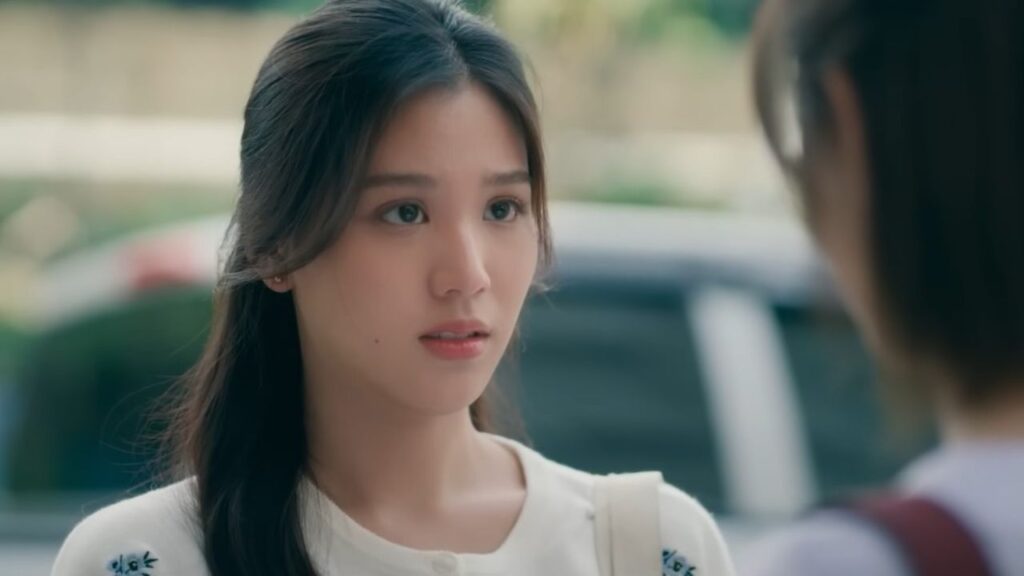
Healthy Doesn’t Mean Boring: It Means Brave
Let’s clear something up. A relationship without yelling, jealousy, or grand acts of sabotage isn’t boring. It’s brave, especially in sapphic storytelling where emotional chaos still gets confused with passion.
We’ve been conditioned to expect the worst from queer love on screen. If there isn’t heartbreak, miscommunication, or betrayal, then is it even “real”? This outdated formula still dominates much of the media landscape and honestly, it’s exhausting.
They’re not just giving us softer aesthetics or gentler pacing. They’re offering something far more radical: emotional responsibility. In shows like Us, 23.5, and Petrichor, characters communicate, apologize, and actually learn from their mistakes. There’s no need to manufacture chaos to move the plot forward because the emotional stakes are real, not just dramatic.
It takes courage to depict love that’s functional, especially when dysfunction is the default; it’s brave to center softness in a genre that’s often expected to be tragic, and it’s deeply validating to see sapphic characters thrive in relationships built on trust.
Healthy GL series prove that emotional maturity is just as compelling as angst, maybe even more so. These aren’t stories that play it safe. They take risks by breaking toxic patterns and offering something better.
Because in a world that is still catching up, showing women love each other well is more than sweet; it is a powerful act of change and hope.
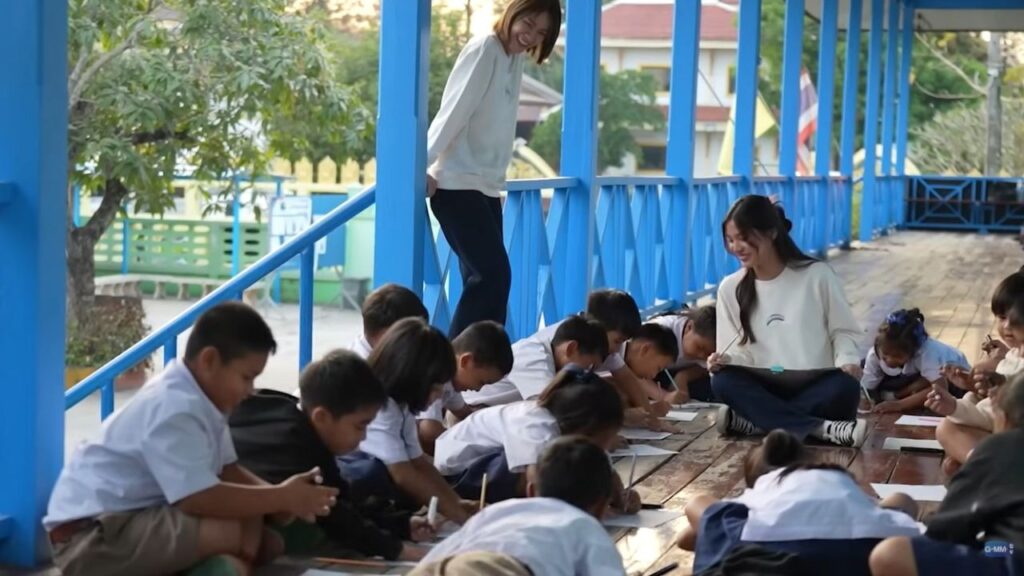
You Deserve to See Yourself in Love That Feels Safe
Representation isn’t just about seeing more faces on screen. It’s about feeling seen in your whole complexity. It means showing relationships that don’t just exist, but thrive with dignity, healing, and hope. That’s exactly what healthy GL series bring to the table.
For so long, sapphic stories have centered trauma and heartbreak, making us believe that love for queer women must be painful to be meaningful. But what if love could be a refuge instead of a battleground? What if it could lift us up rather than tear us down?
These series remind us that love can be soft without being weak. It can be passionate without turning toxic. They show relationships that listen, respect boundaries, and grow together without sacrificing emotional safety. This isn’t just fantasy. It’s the kind of love many of us deserve to see reflected back.
Characters like Dokrak and Pam from Us or Tul and Cherran in Petrichor teach us that emotional honesty and support are revolutionary acts in themselves. They model how partners can navigate life’s challenges side by side, not against each other.
When we watch healthy GL series, we don’t just consume stories. We find hope. Hope that love can be gentle. Hope that we don’t have to settle for chaos. And hope that in this messy world, safe love is possible for all of us.
Because you deserve to see yourself in love that feels safe and powerful.

Add Your Favorite Healthy GL Series
Have you watched any of these healthy GL series? Maybe you’ve found a story that resonated deeply, one that showed love without the usual chaos, drama, or pain. Those stories are worth celebrating because they offer a refreshing vision: love that’s both safe and real.
But the list of healthy GL series doesn’t have to stop here. There are so many gems out there quietly reshaping the genre, proving that sapphic love doesn’t have to come with emotional turmoil to be powerful. Whether it’s a gentle romance that models emotional responsibility or a thrilling story where respect and trust take center stage, these narratives matter.
So, would you add your own favorites to this list? What stories have shown you that healthy relationships can be brave, complex, and inspiring? Sharing these recommendations keeps the conversation going and, more importantly, helps create space for healthier representations to thrive.
In a genre often defined by its most dramatic moments, highlighting healthy GL series is a small but vital act of change. It reminds us and the creators that love that nurtures is just as compelling as love that burns bright and chaotic.
Let’s keep championing sapphic love that nurtures because it matters. Because every viewer deserves to see themselves in stories where love heals, grows, and endures.
What healthy GL story will you add to the list next?
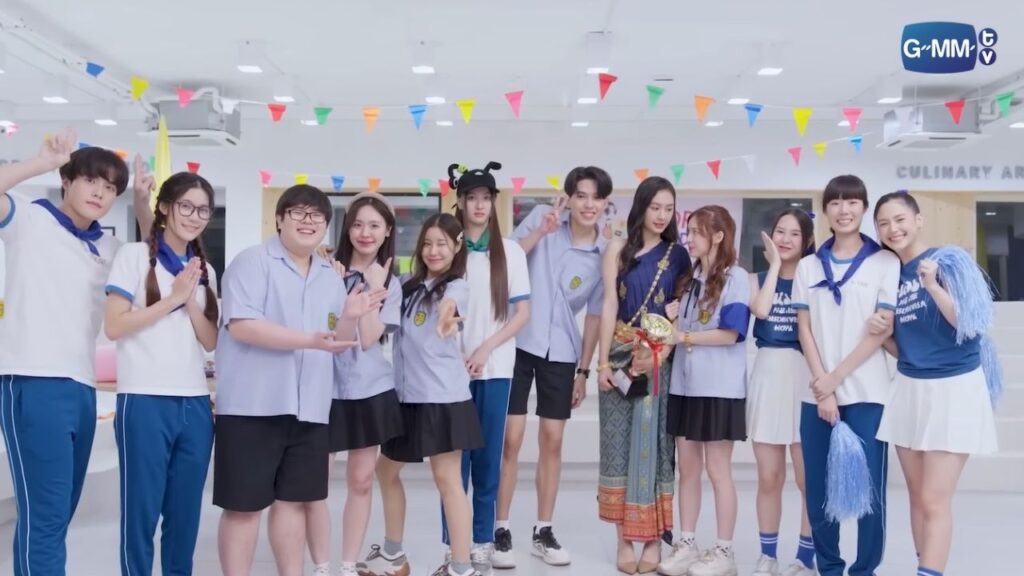
Featured image: Promotional still courtesy of GMMTV.



